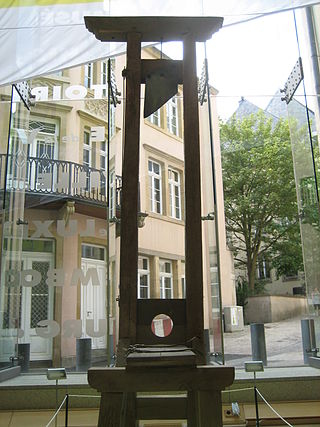Related Research Articles
Capital punishment, also known as the death penalty and formerly called judicial homicide, is the state-sanctioned killing of a person as punishment for actual or supposed misconduct. The sentence ordering that an offender be punished in such a manner is known as a death sentence, and the act of carrying out the sentence is known as an execution. A prisoner who has been sentenced to death and awaits execution is condemned and is commonly referred to as being "on death row". Etymologically, the term capital refers to execution by beheading, but executions are carried out by many methods, including hanging, shooting, lethal injection, stoning, electrocution, and gassing.

Capital punishment, also called the death penalty, is the state-sanctioned killing of a person as a punishment for a crime. It has historically been used in almost every part of the world. Since the mid-19th century many countries have abolished or discontinued the practice. In 2022, the five countries that executed the most people were, in descending order, China, Iran, Saudi Arabia, Egypt, and the United States.
Capital punishment is a legal penalty in China. It is applicable to offenses ranging from murder to drug trafficking. Executions are carried out by lethal injection or by shooting. A survey conducted by TheNew York Times in 2014 found the death penalty retained widespread support in Chinese society.

Capital punishment has been completely abolished in all European countries except for Belarus and Russia, the latter of which has a moratorium and has not carried out an execution since September 1996. The complete ban on capital punishment is enshrined in both the Charter of Fundamental Rights of the European Union (EU) and two widely adopted protocols of the European Convention on Human Rights of the Council of Europe, and is thus considered a central value. Of all modern European countries, San Marino, Portugal, and the Netherlands were the first to abolish capital punishment, whereas only Belarus still practises capital punishment in some form or another. In 2012, Latvia became the last EU member state to abolish capital punishment in wartime.

Capital punishment in Portugal has been abolished. Portugal was a pioneer in the abolition of capital punishment. No executions have been carried out since 1846, with the formal abolition of capital punishment for civil wrong occurring in 1867.

Capital punishment in Nepal has been abolished.
Capital punishment is a legal penalty in Guatemala, and is carried out by lethal injection and, to a lesser extent, the firing squad. The death penalty today remains only in Guatemala's military codes of justice, and was abolished for civilian offences in October 2017.
Capital punishment is no longer a legal punishment in the Independent State of Papua New Guinea.

Capital punishment was abolished in Ukraine in 2000. In 1995 Ukraine entered the Council of Europe and thus was obliged to abolish the death penalty. The Verkhovna Rada introduced amendments to the then-acting Criminal Code in 2000, according to which "death penalty" was withdrawn from the list of official punishments of Ukraine. Ukraine carried out its last execution in 1997 according to Amnesty International.

Capital punishment in Luxembourg was abolished for all crimes in 1979.
Capital punishment in Kyrgyzstan has been abolished.
Capital punishment in Uzbekistan has been abolished.
Capital punishment in Nauru was used prior to its independence in 1968. Prior to the abolition of capital punishment on 12 May 2016, with the passage of the Crimes Act 2016, Amnesty International categorised Nauru as a state that was abolitionist in practice.
Capital punishment in Burkina Faso has been abolished. In late May 2018, the National Assembly of Burkina Faso adopted a new penal code that omitted the death penalty as a sentencing option, thereby abolishing the death penalty for all crimes.

Capital punishment is abolished in Argentina and is no longer a lawful punishment in the country. Argentina abolished capital punishment for ordinary crimes in 1984 and abolished it for all crimes in 2008, supported by the president at the time, Cristina Fernández de Kirchner. Argentina voted in favor of the United Nations moratorium on the death penalty eight times, in 2007, 2008, 2010, 2012, 2014, 2016, 2018, and 2020. Argentina signed the Second Optional Protocol to the International Covenant on Civil and Political Rights on 20 Dec 2006 and ratified it on 2 Sep 2008.
Capital punishment is a legal penalty in Uganda. The death penalty was likely last carried out in 1999, although some sources say the last execution in Uganda took place in 2005. Regardless, Uganda is interchangeably considered a retentionist state with regard to capital punishment, due to absence of "an established practice or policy against carrying out executions," as well as a de facto abolitionist state due to the lack of any executions for over one decade.
Capital punishment was abolished in Burundi on 24 April 2009. Burundi is not a state party to the Second Optional Protocol to the International Covenant on Civil and Political Rights. The last legal execution in Burundi took place in 1997.
Capital punishment in Gabon was officially abolished for all crimes in 2010. Gabon's last execution took place in 1985. Prior to abolition, Gabon was classified as de facto abolitionist, or "abolitionist in practice," due to the length of time since their last execution.
Capital punishment was a legal penalty in Zimbabwe until 2024. The country carried out its last execution in 2005. Zimbabwe abstained during the 2020 United Nations moratorium on the death penalty resolution.
References
- ↑ "Death Penalty | Amnesty International". Amnesty.org. 2014-03-15. Archived from the original on 2014-02-09. Retrieved 2015-06-18.
- 1 2 "HANDS OFF CAIN against death penalty in the world". Handsoffcain.info. Archived from the original on 2016-03-04. Retrieved 2015-06-18.